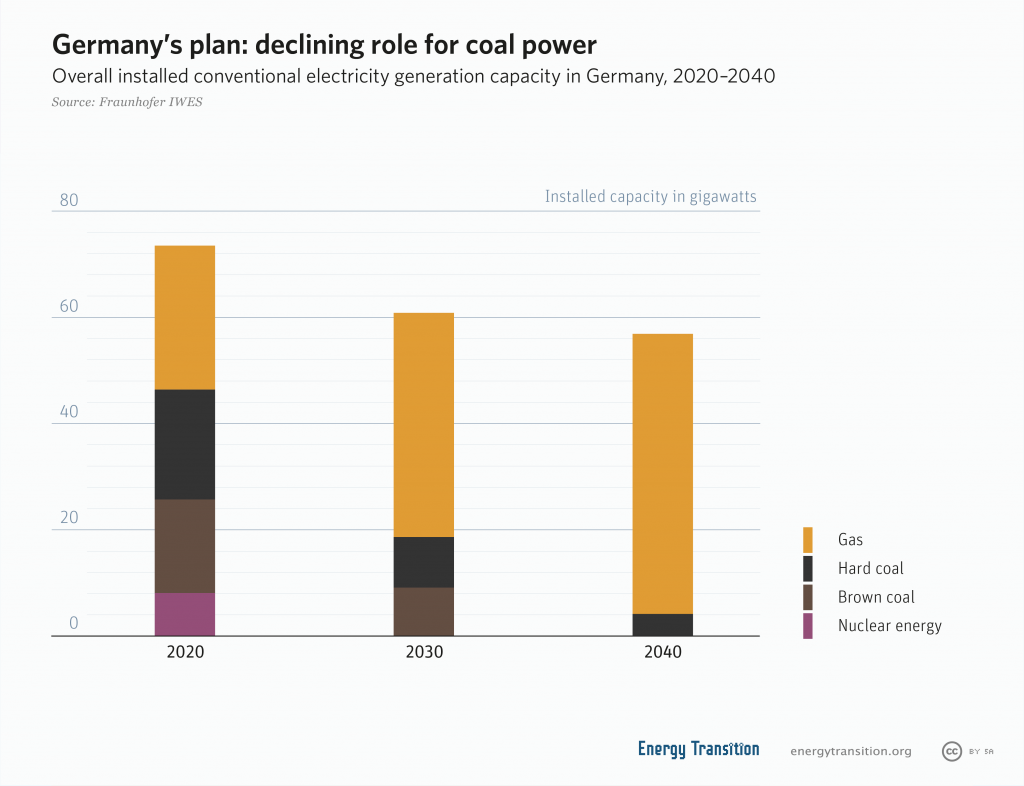To meet climate targets, Germany must reduce electricity from coal. Since the nuclear phaseout was announced coal consumption has fluctuated, rising from 2011 to 2013 but falling below the level of 2010 by 2017. For the first time ever, renewables generated more power than coal in 2018 (118 to 114 billion kilowatt hours respectively). A further reduction is needed for Germany to reach its carbon reduction targets by 2020, however.
When Germany resolved to shut down eight of its seventeen nuclear plants in 2011 and phase out the rest of them by 2022, there was concern that coal power would be ramped up to fill the gap left behind by nuclear.

That switch is not the plan, however, because the country cannot meet its climate targets with coal power. After all, roughly half as much carbon is emitted when natural gas is burned instead of hard coal. Lignite, which is domestically available in Germany in large quantities, is three times more carbon intensive than natural gas. Furthermore, coal plants do not ramp up and down as fast as pumped storage or flexible gas turbines.
Why did coal power consumption temporarily increase?
- The decision to shut down eight nuclear power plants came suddenly, and industry did not have time to replace the missing capacity, so power providers have no choice but to fall back on existing power plants;
- The 2008 economic downturn within the EU reduced energy consumption, thereby indirectly reducing carbon emissions and the price of carbon, and hence, the price of coal power; and
- Coal plants that had been planned in the early 2000s began to go online.
However, the uptick in coal ended in 2015, when Germany replaced its phased out nuclear with renewables. The next step will be to begin the long-awaited coal phaseout by driving down demand and increasing renewable energy.
Plans for new coal plants
Just a few years ago, Germany’s biggest four energy firms planned to build more than 30 new coal plants, but the last coal plant may have already been built in Germany. A number of projects have been abandoned for various reasons ranging from tremendous local protests to difficulties in procuring water rights and – most of all – a reassessment of profitability in light of the boom in renewables. Furthermore, no coal plants have been proposed since the nuclear phase-out of 2011, while several previously planned projects have since been abandoned.
List of coal plants planned in 2006 and current status (May 2019)
| Plant name | Capacity in Megawatts | Status |
| Gemeinschaftskraftwertk Büttel | 800 | cancelled |
| Profen | 660 | cancelled |
| Brunsbüttel | 1820 | cancelled |
| Großkrotzenburg | 1100 | cancelled |
| Hamm Westfalen | 1530 | cancelled |
| Niederaußem | 1100 | cancelled 2019 |
| Stade | 1100 | unclear |
| Datteln 4 | 1055 | unclear |
| Mannheim Block 9 | 911 | operating |
| Hamburg-Moorburg | 1640 | operating (may change fuel to biomass) |
| Kahrlsruhe/Rheinhafen RDK8 | 874 | operating |
| Lünen | 750 | operating |
| Wilhelmshaven | 731 | operating |
| Duisburg-Walsum 10 | 725 | operating |
All in all, about 5910 of the planned 14796 megawatts went online – less than half, while 2155 megawatts remain in dispute (and will probably never be operated).
German Coal Phaseout attempts
In 2015, there was a concerted effort to launch a coal phase-out in Germany. Labor unions took to the streets in protest, estimating that some 100,000 jobs would be on the line. The ambitious plan to place a limit on carbon emissions from coal plants older than 20 years was therefore blocked politically.
Meanwhile, the debate on coal in Germany continues. Most Germans support the goal of a gradual coal phaseout in order to reach Germany’s climate goals (in late 2017, 76 percent of those surveyed were in favor). Despite some differences across parties – 99 percent of the German Greens, versus 70 percent of the neoliberal Free Democratic Party – the message is clear. There have been massive protests against coal mining and a well-organized resistance to coal power.
Interestingly, politicans do not appear to be heeding this signal, as one of the reasons Germany was unable to build a government coalition in 2017 was because of disagreements over setting a coal phaseout date. The “Coal Commission“, launched in 2018, is supposed to provide a roadmap for how Germany will phase out coal, but has been critiqued as unambitious and biased towards coal.